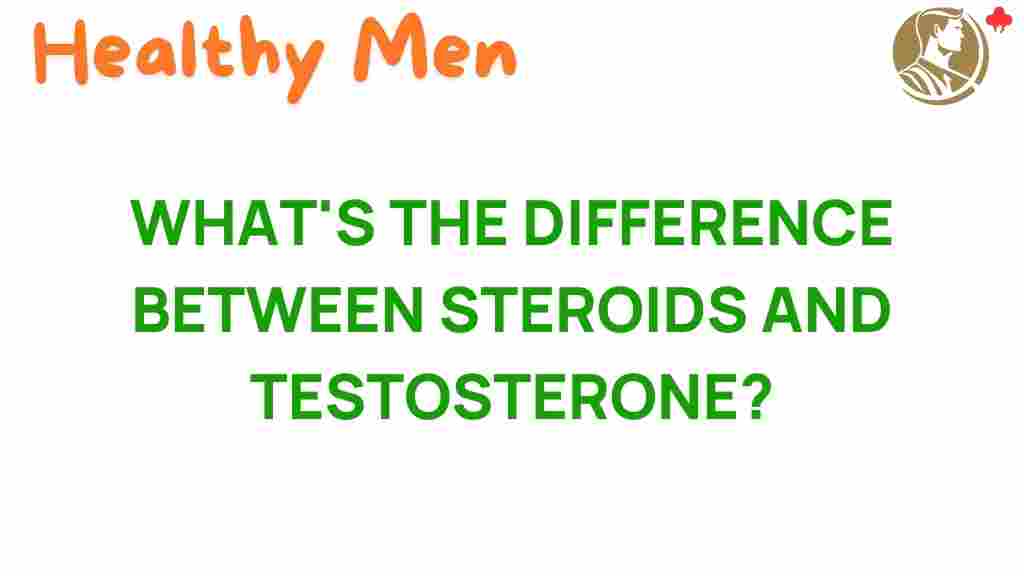Unraveling the Distinct Roles of Steroids and Testosterone
In the world of fitness, bodybuilding, and athletic performance, the terms “steroids” and “testosterone” are often used interchangeably, leading to a plethora of misconceptions. While both play significant roles in performance enhancement, they serve different functions and come with their own set of health risks. This article aims to clarify the distinctions between steroids and testosterone, explore their impact on bodybuilding, and address common misconceptions surrounding these anabolic agents.
Understanding Steroids and Testosterone
Steroids refer to a broad class of synthetic substances that mimic the effects of natural hormones in the body. Testosterone, on the other hand, is a specific hormone produced primarily in the testes in men and in smaller amounts in ovaries in women, as well as in the adrenal glands of both sexes. While testosterone is a type of steroid, not all steroids are testosterone.
The Role of Testosterone in the Body
Testosterone is crucial for various bodily functions, including:
- Muscle Growth: Testosterone promotes muscle protein synthesis, which is essential for muscle growth and recovery.
- Bone Density: It helps in maintaining bone density, reducing the risk of osteoporosis.
- Sexual Health: Testosterone plays a key role in libido and erectile function.
- Fat Distribution: It aids in the regulation of fat distribution in the body.
In the context of bodybuilding and athletic performance, testosterone is often sought after for its ability to enhance strength and promote lean muscle mass.
The Role of Steroids in Performance Enhancement
Steroids, especially anabolic steroids, are synthetic variations of testosterone designed to enhance performance and physical appearance. They work by:
- Increasing Muscle Mass: Anabolic steroids significantly boost muscle mass and strength.
- Enhancing Recovery: They can reduce recovery times between workouts, allowing for more frequent training sessions.
- Improving Endurance: Some steroids improve oxygen delivery to muscles, enhancing endurance for athletes.
However, the use of steroids for performance enhancement often leads to various health risks that users should be aware of.
Health Risks Associated with Steroids
While steroids can offer short-term benefits in terms of performance enhancement and bodybuilding, they come with significant health risks, including:
- Cardiovascular Issues: Steroid use can lead to high blood pressure, increased cholesterol levels, and a higher risk of heart disease.
- Hormonal Imbalances: They can disrupt the natural production of hormones, leading to infertility and hormonal disorders.
- Liver Damage: Oral steroids, in particular, can be toxic to the liver.
- Psychoactive Effects: Users may experience mood swings, aggression, and other psychological effects.
- Dependency and Withdrawal: Prolonged use can lead to dependency and withdrawal symptoms.
It is crucial for individuals considering performance enhancement to weigh these risks against the potential benefits.
Common Misconceptions About Steroids and Testosterone
Many misconceptions cloud the understanding of steroids and testosterone. Here are a few prevalent myths:
- All Steroids Are Bad: Not all steroids are harmful; some have legitimate medical uses when prescribed by a doctor.
- Testosterone Equals Steroids: While testosterone is a steroid, it is not synonymous with all steroids. Understanding the differences is key.
- Only Bodybuilders Use Steroids: Athletes from various sports use anabolic agents to enhance performance, not just bodybuilders.
- Natural Testosterone Boosters Are Safe: Some supplements marketed as natural testosterone boosters can also carry risks and may not be effective.
Performance Enhancement and Bodybuilding: The Right Approach
For those interested in bodybuilding and enhancing athletic performance, understanding the roles of hormones like testosterone and the implications of steroid use is essential. Here’s a step-by-step approach to achieving fitness goals safely:
Step 1: Set Clear Goals
Define what you want to achieve—whether it’s building muscle, increasing strength, or improving overall athletic performance. Having clear goals will guide your training and dietary choices.
Step 2: Focus on Nutrition
A well-balanced diet rich in protein, healthy fats, and carbohydrates is crucial for muscle growth and recovery. Consider consulting a nutritionist for personalized advice.
Step 3: Create a Structured Workout Plan
Implement a comprehensive workout routine that includes strength training, cardiovascular exercises, and flexibility training. Consistency is key to progress.
Step 4: Educate Yourself
Stay informed about the role of hormones in your body. Understanding the science behind testosterone and its effects can help you make more informed decisions about supplementation.
Step 5: Consider Professional Guidance
If considering testosterone therapy or anabolic steroids, consult with a healthcare professional. They can provide insights into the risks and benefits based on your individual health profile.
Troubleshooting Tips for Bodybuilding Enthusiasts
Many individuals face challenges in their fitness journey. Here are some troubleshooting tips:
- Plateaus: If you hit a plateau in your progress, consider changing your workout routine or increasing the intensity of your exercises.
- Recovery Issues: Ensure adequate rest and nutrition to facilitate recovery. Overtraining can hinder progress.
- Nutritional Gaps: If you struggle with meeting your nutritional needs, consider supplements but consult with a healthcare provider first.
Conclusion
Understanding the distinct roles of steroids and testosterone is crucial for anyone involved in bodybuilding or athletic performance. While testosterone is a vital hormone for muscle growth and overall health, the misuse of steroids presents significant health risks that should not be overlooked. By educating yourself on these topics and adopting a responsible approach to performance enhancement, you can achieve your fitness goals while prioritizing your health.
For more information on safe practices in bodybuilding and performance enhancement, check out this in-depth resource. Additionally, if you’re looking for guidance on hormone health, visit Endocrine Society’s website for credible information.
This article is in the category Conditions and created by healthymen Team
